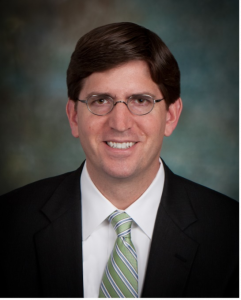Podcast: Play in new window | Download

Stephen Nuckolls grew up listening to his physician father talk about how healthcare could save money for Medicare if it was accountable for outcomes. It was with this intent that he built Coastal Carolina Health Care (CCHC) in 1998, a multi-specialty practice managing 36,000 patients with 60 providers across 16 sites of care in Eastern North Carolina. CCHC serves in both urban and rural communities, with a mission is to promote the health of its patients by providing high quality, compassionate, comprehensive, and personalized health care.
It’s no surprise that Stephen and his team formed one of the first 27 MSSP ACOs, Coastal Carolina Quality Care. Currently in the 8th year of the Medicare Shared Savings Program (ENHANCED Track), the ACO performs at the highest quality levels nationally and has saved consecutive years. The ACO exemplifies the vision of Stephen’s leadership, captured in the ACO’s slogan, “Tomorrow’s Health Care Delivered Today.”
Episode Bookmarks:
05:00 Stephen reflects on the influence of his physician father who championed value-based care early on
05:40 Setting up Coastal Carolina Health Care, PA (CCHC), a multi-specialty group practice, in 1998 to be accountable for cost and quality
06:00 Leveraging ancillary services and electronic health records to prepare for the future state of value-based care
06:45 The passage of the Affordable Care Act in 2010 as an opportunity for Stephen’s practice to demonstrate value
07:00 Stephen and his physicians head to Washington, D.C. to collaborate with CMS on the early design of the Medicare Shared Savings Program
07:20 The struggles of balancing FFS and VBC in the early years of Coastal Carolina Quality Care (CCQC) ACO
08:45 “It’s not the actual doctor services that are expensive. The real big costs are in hospitalizations.”
09:00 ACO Care Management dropped Hospital Admissions per 1000 by 22%
11:00 Engaging physicians in the early years of the ACO before Shared Savings performance
12:30 Mandatory transition to downside risk in the “Pathways to Success” MSSP final rule and how ACOs should evaluate potential for future success
13:30 Getting comfortable and fully understanding the ACO benchmarking methodology
13:50 “Ultimately we need to have risk in the game, but we need to recognize that different ACOs are in different periods in their transformation.”
14:00 How CCQC ACO is consistently ranked among the top performers nationally in quality measure performance, clinical outcomes, and Shared Savings returns
16:00 How having one practice in the ACO with one electronic health record supported quality outcomes
17:00 Selecting “true north” standardized quality measures that are managed consistently across the entire payer contract portfolio for all patients
17:20 Implementing a successful point-of-care quality measure reporting dashboard
18:00 Developing an equitable physician compensation/incentive structure as a key to success for driving quality
19:00 ACO concerns related to diminishing returns over time due to sustained performance in comparison to the benchmark
21:00 Advantages in specialist integration within the ACO due to multispecialty practice model
23:00 Capital investments required to build an ACO population health management infrastructure
26:00 Efficiencies gained by being a one-TIN/one practice ACO and how Advanced Payment ACO Model funds were used to build a Chronic Care Management program
27:00 Investments in automated dashboards for quality reporting to identify and manage gaps in care
28:00 Annual Wellness Visits (AWVs) as a source of funds for practice transformation in primary care
29:00 Reinvesting funds back into the ACO versus distribution to physicians
29:30 A recent investment in an “extended care” clinic (a higher acuity center with ER physicians, hospitalists, and nurses)
31:00 How the extended care clinic resulted in an ER visit per 1000 rate of 25 for self-insured employees (compared to statewide commercial ER/K benchmark of 200)
31:30 Implementing a palliative care program to improve end-of-life care and chronic disease management
34:00 Recent changes to ACO benchmarking methodology that includes a regional efficiency adjustment and how that affects rural communities (“the rural glitch”)
36:30 Stephen provides guidance to ACO executives on understanding the impacts of benchmarking methodology and risk adjustment
37:30 “Our industry focuses so much on Risk Adjustment, especially in Medicare Advantage plans. It is a ‘necessary evil’ by nature of how the system is set up, but we really need to focus on taking care of the patient and making them healthier. As long as you are doing those things, the money will work out.”
40:00 Stephen provides his perspective on the new Direct Contracting Model
41:30 The Geographic (“Geo”) Direct Contracting model has a different risk adjustment methodology than Medicare Advantage
42:30 Congress and the ONC’s role in promoting interoperability and preventing information blocking
46:00 Stephen’s thoughts on the future of value-based care in the Biden Administration
48:30 What CCHC is doing to ensure equitable distribution of COVID-19 vaccines to high-risk patients in rural communities
